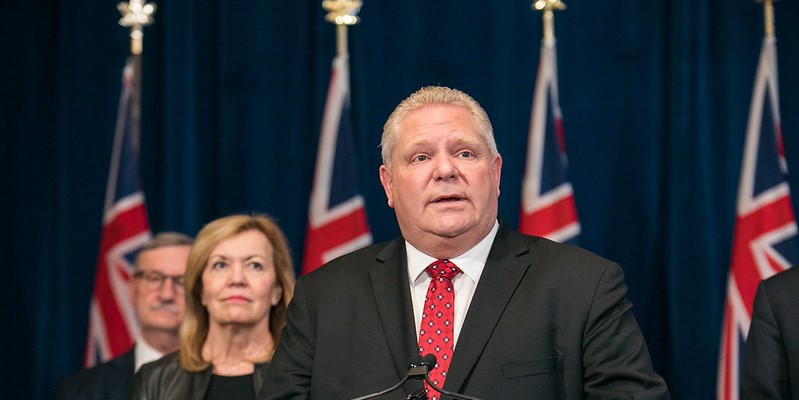To restore Ontario’s finances, Ford government must end carefree spending

When the Ford government tables its next budget this week, it has an opportunity to address Ontario’s fiscal challenges. But to do this, it must change course and restrain spending—something it’s been unwilling to do so far.
Before taking office, the Progressive Conservatives often criticized the Wynne government’s bad habit of spending and borrowing. Premier Ford’s first finance minister, Vic Fedeli, chastised the Wynne government for its inclination to “live on the taxpayers’ credit card” and act as though “money grew on trees.”
However, despite paying lip service in Opposition, the Ford government has spent and borrowed money at a comparable rate to its predecessors. Indeed, according to recent data, the Ford government is on track to exceed the highest per-person spending levels reached at any point during Premier Wynne’s time in office.
Due to the Ford government’s carefree approach to spending, the province has run large deficits and racked up a significant amount of debt. Provincial debt (adjusted for inflation) has increased by roughly $32 billion since the Ford government took office in 2018. While the government did record an operating surplus in 2021, it will return to a projected deficit in 2022 and surpass $407 billion in debt by the end of March. This translates to approximately $27,000 in provincial debt per Ontarian.
Consequently, Ontario’s debt burden equals 38.7 per cent of the provincial economy. This 38.7 per cent figure—what economists call the “debt-to-GDP ratio”— is the highest in Canada (including Quebec) and near Ontario’s all-time high.
And the problems don’t stop there. The Ford government doesn’t expect to balance the budget again until at least 2025 so debt will continue to rise in the years ahead.
The dismal state of Ontario’s finances, combined with the province’s weak economic growth prospects, led the Parliamentary Budget Officer (PBO) to conclude that Ontario’s government finances are unsustainable—which means debt is projected to grow faster than the provincial economy in the coming decades.
So, what are the consequences for Ontarians?
Obviously, like households, Ontario must pay interest on the debt it has and any new debt it adds. Due to rising interest rates, debt will become more expensive to service. The province expects to spend $13.6 billion on debt interest costs this year—roughly $900 per Ontarian. This is money unavailable for tax relief, health care or education. And of course, the debt itself must be repaid at some point by future generations of Ontarians, so taxes must eventually increase or future spending must decrease to pay for today’s debt.
But there’s good news. In its upcoming budget, the Ford government can change the trajectory of debt and restore fiscal sustainability in Ontario by bringing spending back in line with revenues.
Indeed, balancing the budget through spending restraint is the best way to brighten Ontario’s fiscal future. But if the Ford government fails to tackle the province’s fiscal challenges soon, the consequences will be felt for many years by all Ontarians.
Author:
Subscribe to the Fraser Institute
Get the latest news from the Fraser Institute on the latest research studies, news and events.

